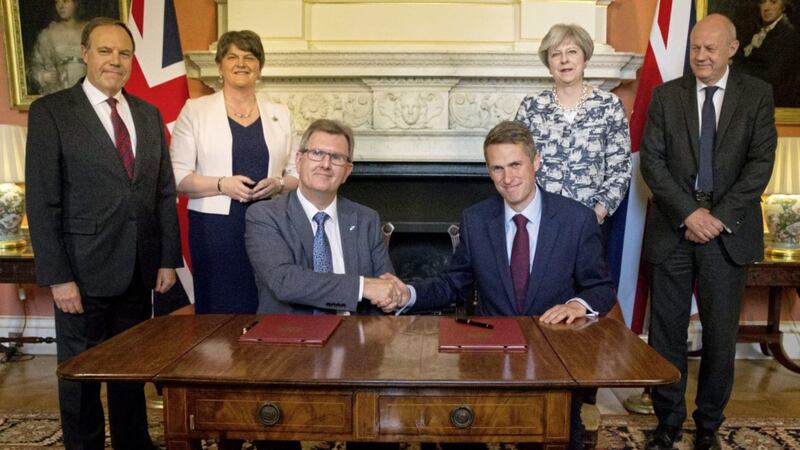THE £1 billion funding boost from the Conservatives and DUP's political agreement is not the "silver bullet" that will regenerate the north's economy the latest report has forecast.
The Northern Ireland Economic Outlook (NIEO) from PricewaterhouseCoopers (PwC) says that we can expect economic growth of one per cent in 2017, falling to 0.9 per cent in 2018, the lowest of all UK regions.
PwC accept that the ‘confidence and supply’ arrangement between the DUP and Conservatives will provide a "welcome boost" to the economy, but stopped short of espousing its long-term benefits.
Dr David Armstrong, PwC partner, believes that the additional money will alleviate some immediate problems, but issues like productivity, reform of agri-food and scaling-up the private sector remain unresolved.
“The investment package will alleviate some urgent current pressures, but it is not the silver bullet that will regenerate an underperforming economy," he said.
"Employment has now recovered to more than the pre financial crisis peak, but virtually all other recovery measures remain below their 2007 level. Rising inflation means real wage growth is now negative, household savings levels are at their lowest since the early 1960s, so medium-term growth prospects are not encouraging.
“The good news is that the local economy will keep on growing, although a combination of decelerating consumer expenditure, lacklustre business investment and Brexit jitters, suggest that growth will slow. We now expect the Northern Ireland economy to grow by around 0.9 per cent in 2018 - well behind the forecast UK growth of 1.4 per cent and the lowest amongst the UK regions.”
The NIEO’s recovery index measures how much ground the local economy has made up as compared to the region’s peak economic performance, which occurred before banking crisis and housing slump that began in mid-2007.
The index suggests that, while employment has not passed the pre-crisis peak, real wages are still only 94 per cent of their 2005 levels and real household disposable incomes are only 89 per cent of their 2005 levels – that’s equivalent to an annual income cut of around £1,810.
Job creation is not being accompanied by a proportionate increase in wealth-creation, so further economic recovery will rely on an increase in productivity and knock-on increases in real wages and household incomes the report said.
Looking at the Northern Ireland agri-food sector the PwC index highlighted its importance to the economy, with 87 per cent of Northern Ireland farm incomes coming from EU Common Agricultural Policy(CAP) payments.
They have warned that farmers face an "inevitable" reduction in subsidies post-Brexit.
“The global trend is towards reducing subsidies to farmers, removing trade barriers and encouraging efficiency, productivity and an export focus," Dr Armstrong said.
“The percentage of the EU budget going to CAP is expected to decrease further after 2020, suggesting that, as subsidies decline and borders open, reform is inevitable, regardless of Brexit. The challenge for the industry and politicians is to identify the options, create a reform strategy and manage the process with the minimum impact on the producer and processor sectors."








